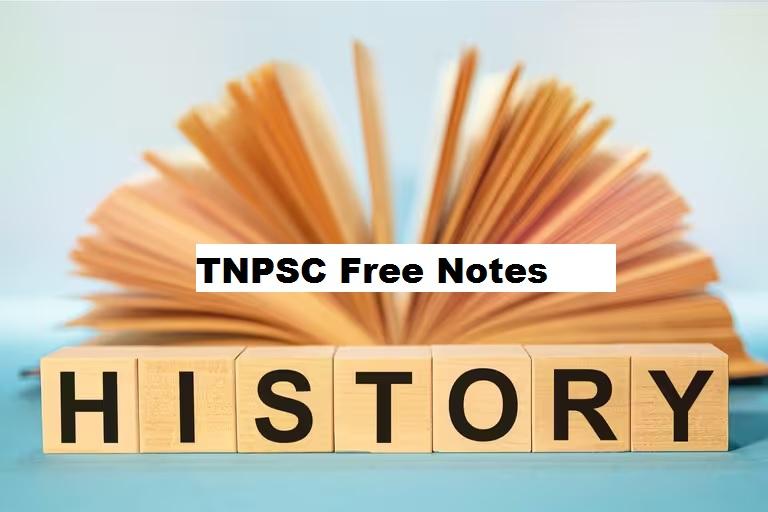இந்தக் கட்டுரையில், TNPSC குரூப் 1, குரூப் 2, குரூப் 2A, குரூப் 4 மாநிலப் போட்டித் தேர்வுகளான TNUSRB, TRB, TET, TNEB போன்றவற்றுக்கான முறைகள் இலவசக் குறிப்புகளைப் பெறுவீர்கள்.தேர்வுக்கு தயாராவோர் இங்குள்ள பாடக்குறிப்புகளை படித்து பயன்பெற வாழ்த்துகிறோம்.
Administration of the Sultanate
State and Society
The Sultanate was formally considered to be an Islamic State.
Most of the Sultans preferred to call themselves the lieutenant of the Caliph. The
Sultans were the supreme political heads.
As military head, they wielded the authority of commander-in-chief of the armed forces.
As judicial head, they were the highest court of appeal.
Balban claimed that he ruled as the representative of God on earth.
Ala-ud-din Khalji claimed absolute power, he did what was essential for the good of the
state and the benefit of the people.
The Delhi Sultanate deserves to be considered an all-India empire. Virtually all of India,
except Kashmir and Kerala at the far ends of the subcontinent, had come under the
direct rule of Delhi towards the close of Muhammad bin Tughlaq’s rule.
The Sultans required the holders of Iqta’s (called muqtis or walis) to maintain troops for
royal service out of the taxes collected by them.
Certain areas were retained by the Sultans under their direct control (khalisa). The
revenue collected from such areas were paid as salaries to the officers and soldiers of
the Sultan’s own troops (Hashm-i qalb).
The Turko-Afghan political conquests were followed by large- scale Muslim social
migrations from Central Asia.
India was seen as a land of opportunity. The society in all stages was based on privileges
with the higher classes enjoying a better socio-economic life with little regard of one’s
religion.
The Sultans and the nobles were the most important privileged class who enjoyed a
lifestyle of high standard in comparison to their contemporary rulers all over the world.
The nobility was initially composed of the Turks only. Afghans, Iranians and Indian
Muslims were excluded from the nobility for a very long time.
The personal status of an individual in Islam depended solely on one’s abilities and
achievements, not on one’s birth. So, once converted to Islam, everyone was treated as
equal to everyone in the society.
Religion
Unlike Hindus who worshiped different deities, Muslims followed monotheism.
They also adhered to one basic set of beliefs and practices.
Though a monotheistic trend in Hinduism had long existed, as, for example in the
Bhagavad Gita, as noted by Al-Beruni, its proximity to Islam did help to move
monotheism from periphery to the centre.
An important aspect of Islam in India was its early acceptance of long-term coexistence
with Hinduism, despite all the violence that occurred in military campaigns, conquests
and depredations.
The conqueror Mu’izzuddin of Ghor had, on some of his gold coins, stamped the image
of the goddess Lakshmi.
Muhammad Tughlaq in 1325 issued a farman enjoining that protection be extended by
all officers to Jain priests; he himself played holi and consorted with yogis.
The historian Barani noted with some bitterness how ‘the kings of Islam’ showed
respect to ‘Hindus, Mongols, Polytheists and infidels’, by making them sit on masnad
(cushions) and by honouring them in other ways, and how the Hindus upon paying taxes
(jiziya-o-kharaj) were allowed to have their temples and celebrations, employ Muslim
servants, and flaunt their titles (Rai, Rana, Thakur, Sah, Mahta, Pandit, etc), right in the
capital seats of Muslim rulers.
Caste and Women
The Sultans did not alter many of the social institutions inherited from ‘Indian
Feudalism’.
Slavery, though it had already existed in India, grew substantially in the thirteenth and
fourteenth centuries. Both in war and in the event of default in payment of taxes,
people could be enslaved.
They were put to work as domestic servants as well as in crafts.
The village community and the caste system remained largely unaltered.
Gender inequalities remained practically untouched.
In upper-class Muslim society, women had to observe purdah. However, despite purdah
Muslim women, enjoyed, in certain respects, higher status and greater freedom in
society than most Hindu women.
Muslim womens could inherit property from their parents and obtain divorce, but Hindu
women did not have that privileges.
In the Islamic tradition, the practice of sati by widows is not known.
Islam was not against women being taught to read and write. But it tolerated polygamy.
Sultan Firoz Tughlaq was reputed to possess 180,000 slaves, of which 12,000 worked as
artisans. His principal minister, Khan Jahan Maqbul, possessed over 2000 women slaves.
Central Administration
The Sultan was assisted by a number of departments and officials in his administration.
The post of Naib was the most powerful one.
The Naib practically enjoyed all the powers of the Sultan and exercised general control
over all the departments.
Next to him was the Wazir who was heading the finance department called Diwani
Wizarat.
The military department was called Diwani Ariz. It was headed by Ariz-i-mumalik. He
was responsible for recruiting the soldiers and administering the military department.
He was not the commander-in-chief of the army. The Sultan himself was the
commander-in-chief of the army.
The military department was first set up by Balban and it was further improved by
Alauddin Khalji under whom the strength of the army crossed three lakh soldiers.
Alauddin introduced the system of branding of the horses and payment of salary in cash.
Cavalry was given importance under the Delhi Sultanate.
Diwani Rasalat was the department of religious affairs. It was headed by chief Sadr.
Grants were made by this department for the construction and maintenance of
mosques, tombs and madrasas.
The head of the judicial department was the chief Qazi. Other judges or Qazis were
appointed in various parts of the Sultanate.
Muslim personal law or sharia was followed in civil matters. The Hindus were governed
by their own personal law and their cases were dispensed by the village panchayats.
The criminal law was based on the rules and regulations made by the Sultans.
The department of correspondence was called Diwani Insha. All the correspondence
between the ruler and the officials was dealt with by this department.
Local Administration
The provinces under the Delhi Sultanate were called iqtas.
They were initially under the control of the nobles. But the governors of the provinces
were called the muqtis or walis. They were to maintain law and order and collect land
revenue.
The provinces were divided into shiqs and the next division was pargana. The shiq was
under the control of shiqdar.
The pargana comprising a number of villages was headed by amil. The village remained
the basic unit of the administration. The village headman was known as muqaddam or
chaudhri. The village accountant was called patwari.
**************************************************************************
| Adda247 TamilNadu Home page | Click here |
| Official Website=Adda247 | Click here |




